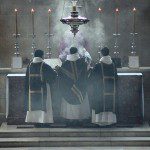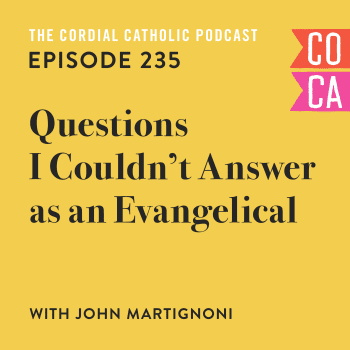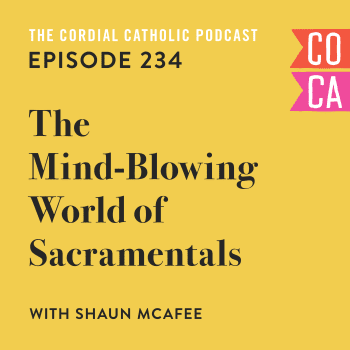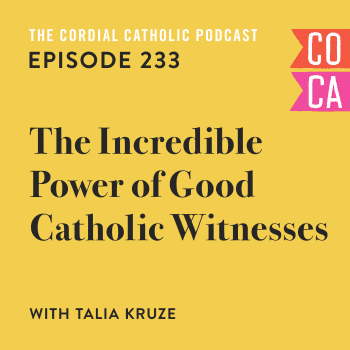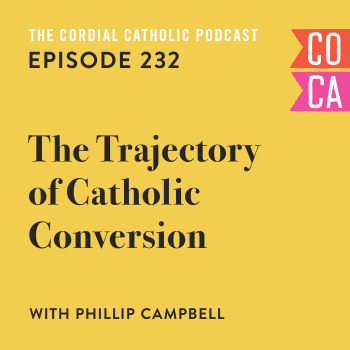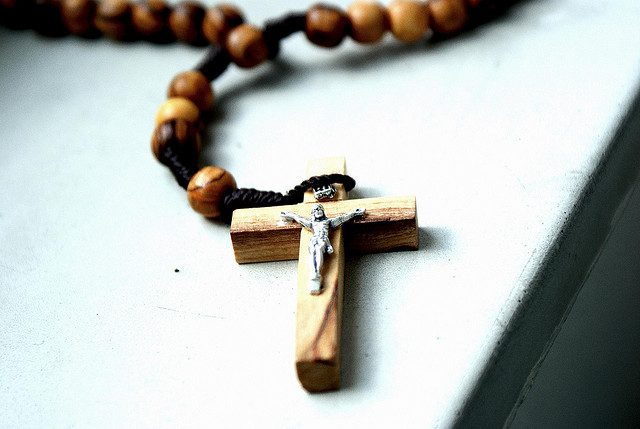
After a radical conversion to Christ at the age of fifteen I lived as a genuinely devout Protestant, earnestly seeking after Christ in my life as best I could.
Sometimes, of course, doing a miserable job.
This Easter, after a long journey, I’ll become a Catholic.
My journey began when a Protestant pastor—himself on a journey towards a more ancient faith—asked me the question, “What’s more important the Bible or tradition?”
My answer was typically Protestant, “The Bible, of course.”
“But who put the Bible together?”
That was the tradition of the Church, of course—the thought came as a bit of a revelation.
I was subsequently set on a journey that lasted nearly a decade. A journey which introduced me to a podcasting priest, some Catholic friends, and even saw me attending Mass a couple of times. But Catholicism held no great appeal to me, at least not until I began to read.
I began to read about Catholicism from authors who were actual Catholics, instead of reading about what Protestant authors thought, or thought they knew, about Catholicism. I found out in a hurry that much of what I knew about Catholicism (from the Protestant sources I’ve read, and from the few Catholics I’d met) was inaccurate, to say the least.
If I’d known what Catholics really believed, I would’ve become Catholic a lot sooner.
I first read my way into the Church through authors like Louis Bouyer, Pope Benedict XVI, Scott Hahn, Stephen Ray, and G.K. Chesterton.
First, it was an intellectual conversion. I was a Catholic, theologically, there became no doubt.
But then I began to live like a Catholic by going to Mass and praying the Rosary and the Liturgy of the Hours.
And that’s when I really became Catholic. Spiritually.
If I were to distill my journey into only a few words I would say this: I’ve become a Catholic because I’ve found the Catholic faith to be historically, intellectually, spiritually, and aesthetically satisfying.
Although, satisfying is hardly the right word, I’ve struggled to find a better one.
It’ll have to do for now.
The Catholic Church is Historically Satisfying
I don’t say this to be facetious but I have a hard time understanding a reading of the Early Church Fathers that doesn’t result in the conclusion that the Catholic Church must’ve been what Jesus had in mind.
I say this because, I believe, the Catholic Church makes the most historical sense.
The Catholic Church traces its origins to Jesus Christ himself.
When Jesus gave Peter and the apostles the authority to bind and loose, to forgive sins and drive out demons, and charged them with the care of God’s people they did just that. The New Testament Scriptures are clear: they established churches. When leaders, like the Apostle Judas, died or were killed (or betrayed Christ and killed themselves), they appointed new leaders to take their places.
The Early Church had a clear authoritative structure.
It’s even more clear, as I said, from even a cursory reading of the Early Church Fathers. The successors to the Apostles.
Take Clement of Rome, for example.
Clement, the earliest of the Church Fathers, writes under the title of Bishop of Rome, a title which scholars suggest was given to him by the Apostle Peter himself. Clement’s epistle is the oldest we have apart from those collected in the New Testament. His intention in writing: to correct a church in Corinth who weren’t respecting their bishop and his authority.
The oldest writing of the Church Fathers that we have is a letter exhorting a church to respect it’s bishop. (This is also what the bulk of Paul’s writings were about as well, so we shouldn’t be too surprised.)
Subsequent Early Church Fathers are even more clear.
The hierarchical, authoritative structure of the Early Church was clearly Catholic and that structure has passed on, subsequently, down through the ages, these last two thousands years.
The Catholic Church can trace that lineage.
I found the Catholic Church to be historically satisfying because it’s historically sound. Because it can clearly trace it’s roots back to the very first apostles and to Christ’s promise to build a Church, and to let nothing overcome it. If we take Jesus at His word what other conclusion can we make?
Has something overcome the Church? Then Jesus is a liar and not God.
Was he speaking about an invisible Church? Then why did the very first Christians appoint leaders over a very real, physical Church? And pass on that leadership?
The Catholic Church is Intellectually Satisfying
I read my way into the Catholic Church and what I’ve read has been incredibly enriching.
What I’ve found in Catholicism, apart from anything I’ve ever encountered in my Evangelical faith, has been a complete and coherent theology—an unmatched, consistent, and intelligent perspective on the world.
A perspective that’s been subjected to two thousand years worth of scrutiny, and constant refinement and reform.
As an Evangelical I was, by and large, left to fend for myself on issues of theology, morality, and spirituality. There’s no teaching authority the Evangelical world apart from each denomination—and there are, estimably, 30,000 of them—and, in real fact, no real authority apart from each local church and congregation.
Even within each congregation interpretations of important theologies can differ greatly.
Ultimately, it was left up to me to distill my own theology. To decide what I believed and what made the most sense based on what I’ve read, who I’ve listened to, and the community I’m a part of.
As Evangelicals, we chew these kinds of things over with our friends—those in our somewhat insular communities—and settled difficult theology that way.
As a Catholic, the teachings of the Church, based on the authority that Jesus gave the first apostles (that was, as I’ve shown, passed down) has the ability to speak definitively on morality, spirituality, and theology.
And what the Church presents is a clear, consistent theology.
The same reason why the Church teaches that only men can be called to the priesthood is part and parcel of the same theology behind why marriage is between and woman and a man exclusively. Which is also part of the same coherent theology behind why Jesus is actually present in the Eucharistic elements, and why the Catholic Church worships the way that it does.
Rather than a piecemeal theology, the Catholic Church presents a clear narrative which stands up to the most intellectually rigorous examinations. And rather than relying on myself as a biblical scholar and theologian to piece together my own beliefs—is that what God intended?—I can dig into the teachings of two thousands years of scholarship and tradition.
The Catholic Church is Spiritually Satisfying
If you had asked me about Catholic spirituality before I began my journey into the Catholic Church I would’ve suggested that it was largely empty piety: That most Catholics merely warmed the pews on Sundays, prayed to statues, and didn’t know their Bibles.
While some of this may certainly be true for many Catholics the same can be said—at least as far as the pew warming and Bible study goes—for many nominal Protestant Christians as well.
Suffice to say, when I actually began to dig into Catholic spirituality I was shocked.
Did you know, for example, that Mass is offered daily at most parishes?
Devout Catholics can go to church every day.
How’s that for spiritually satisfying?
What’s more, Catholic spirituality is two thousand years old and encompasses a myriad of enriching practices and traditions.
From rich traditions of Bible study like the Ignatian Method pioneered by St. Ignatius in the 15th century to the prayers of the Rosary and even the Mass itself, which can be found profoundly expressed—and profoundly similar to the Mass of today—in a document dating from between 40-60AD.
Where my narrow practice of Christian spirituality used to be reading my Bible, personal and private prayer, and attending worship services, Catholicism has opened the door to an ancient and robust spirituality practiced by some of the very earliest Christians—and carried on today.
And in no way does it diminish the piety I had as an Evangelical. In all ways, instead, it’s enhanced.
The Catholic Church is Aesthetically Satisfying
When I first started writing about my reasons for becoming Catholic I didn’t include this category because I hadn’t been around the Catholic Church long enough to understand what it meant.
I get it now, and I hope I can explain it sufficiently.
The Catholic Church is aesthetically satisfying in that the language it uses, the level of devotion and beauty, and the message it espouses, surrounds the devout Catholic in a world completely of its own. A completely Christian world.
A whole other plane of existence—truly.
I was recently talking to a Protestant friend—a friend who’d been baptized Catholic but left the Church—who said one of the appeals of the Catholic Church over her experience of Evangelical Protestantism was the level of devotion and reverence for God.
That God is truly and deeply worshiped in a Catholic Mass.
That’s what I mean, exactly.
In many Evangelical Protestant churches Jesus is our buddy—our friend—and there’s certainly nothing wrong with that. He’s that to Catholics as well. But He’s also God, King Jesus, as N.T. Wright says, and He deserves our reverence as well.
That was missing in my experience of Christianity, as an Evangelical.
Likewise, the emphasis on beauty, poetry, and language in the Catholic Church is so rich, and deep, it could take a lifetime just to plumb below the surface. Take a look at any older Catholic Church, even many modern ones, and you’ll find a richness of meaning in every aspect.
All pointing to Christ. The whole environment.
Why I Became a Catholic this Easter
I become a Catholic this Easter, ultimately, because the Holy Spirit drew me in.
We can become Catholics—and Christians—in really no other way.
I can’t work my way towards God anymore than I can work my way into Heaven. God called me, and I responded.
As an Evangelical Protestant, I thought I understood my faith, its roots, and what it meant to be a Christian. As a Catholic, I’ve found much more than I ever imagined.
I’ve found a faith that has its roots in history, its origins with Jesus and the Apostles immediately charged by Him with the founding of a Church. I’ve found a faith that stands up to intellectual rigour—that embraces it—and that’s coherent and complete. I’ve found a deep, rich spirituality that I can spend a lifetime discovering, and rediscovering—that’s been tried and true. And, finally, I’ve found a beauty, a language, and a way of life that’s artful, reverent, and ocean-deep.
Incredible.
That’s why I’ll become a Catholic this Easter.
This post was originally written for my personal blog and posted Easter 2015. This Easter marks my first full year as a Catholic and also is cause for greater celebration as my beautiful wife joins the Church at the Easter Vigil. A few weeks later we’ll be baptizing our son, too.
Thank you for your kind words, for reading, and for sharing. God bless. Deo Gratias.
Stay in touch! Like The Cordial Catholic on Facebook:

